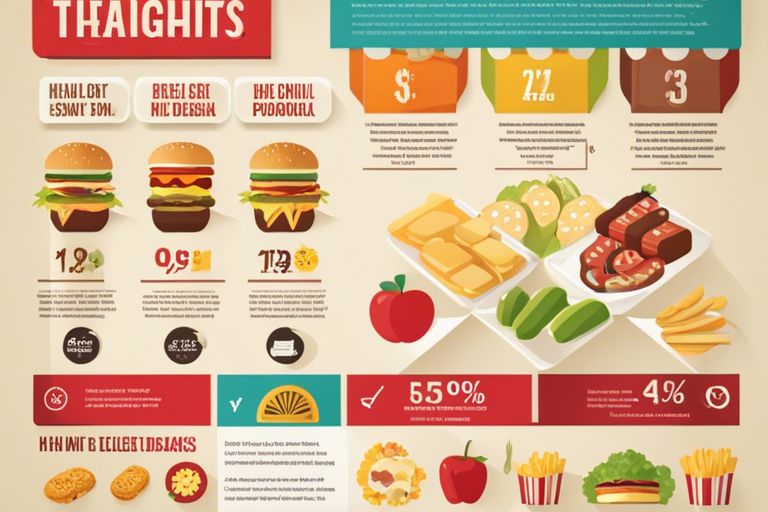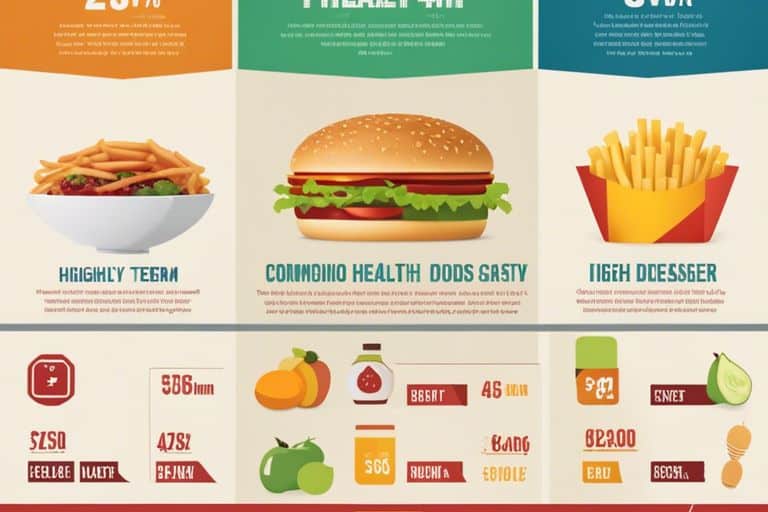You may find yourself tempted by the convenience and affordability of fast food options, but have you considered the long-term health implications of regularly consuming these meals? In this blog post, we will probe into the potential risks associated with a fast food diet and explore whether the temporary satisfaction is truly worth jeopardizing your well-being in the future. Let’s break down the facts and arm you with the knowledge to make informed decisions about your dietary choices.
Key Takeaways:
- Regular consumption: Eating fast food frequently can lead to long-term health risks such as obesity, heart disease, diabetes, and high blood pressure.
- Lack of nutrients: Fast food is usually high in unhealthy fats, sugars, and sodium, while lacking vital nutrients like vitamins, minerals, and fiber.
- Importance of moderation: While indulging in fast food occasionally is not harmful, it is crucial to balance it with a diet rich in fruits, vegetables, whole grains, and lean proteins to maintain long-term health.

Understanding Fast Food
There’s no denying that fast food has become a staple in many people’s diets. From burgers and fries to pizza and tacos, fast food offers convenience and affordability for those on the go. However, it’s important to understand the impact that consuming these types of foods can have on our long-term health.
Defining Fast Food
Food that is categorized as fast food is typically characterized by its quick preparation time and availability for consumption on the go. These foods are often high in calories, saturated fats, sugars, and sodium, making them a convenient but unhealthy choice for many individuals.
Fast food establishments are known for their drive-thru services, limited seating areas, and menu items that are designed to be prepared quickly and easily. Popular fast food chains such as McDonald’s, Taco Bell, and Burger King are known for their signature items that have become iconic in American culture.
The Nutritional Profile of Common Fast Food Items
For many people, the appeal of fast food lies in its delicious taste and convenience. However, it’s important to consider the nutritional profile of these menu items. Many fast food items are high in unhealthy fats, sugars, and calories, which can contribute to weight gain, heart disease, and other health issues over time.
Any individual looking to make healthier choices should be aware of the nutritional content of common fast food items. Understanding the caloric content, levels of saturated and trans fats, and sugar content can help individuals make more informed decisions when it comes to their food choices.
Health Implications of Fast Food
Short-Term Effects on Health
Any time you consume fast food, your body is subjected to a range of immediate health impacts. These often include feelings of sluggishness and fatigue due to the high levels of sodium, saturated fats, and sugar present in many fast food items. Additionally, consuming fast food regularly can lead to spikes and crashes in energy levels, impacting your ability to focus and concentrate.
Furthermore, the excessive intake of fast food can also result in digestive issues such as bloating, gas, and indigestion. These discomforts can quickly arise after consuming a fast food meal, making you feel physically ill and uncomfortable.
Long-Term Health Risks Associated with Fast Food
Implications of regularly consuming fast food extend beyond the immediate effects, with serious long-term health risks. The consistent intake of fast food has been linked to obesity, heart disease, diabetes, and high blood pressure. These conditions can significantly decrease your quality of life and lead to chronic health problems in the future.
With the abundance of processed ingredients and artificial additives in fast food, individuals who frequently consume these items are at a higher risk of developing serious health issues over time. Making mindful choices about your diet and limiting fast food intake can greatly reduce the likelihood of encountering these long-term health risks.
The Economic and Social Factors
Not only does fast food have detrimental effects on individual health, but its consumption also has broader economic and social implications. The convenience and affordability of fast food make it a popular choice for many individuals, but at what cost?
The Cost of Convenience
Socially, the rise of fast food culture has led to an increase in sedentary lifestyles and a decrease in home-cooked meals. Families are opting for the convenience of drive-thru meals rather than sitting down together for a home-cooked dinner. This shift has not only impacted our physical health but has also affected the social fabric of our communities.
The easy accessibility and low cost of fast food may seem like a bargain in the short term, but the long-term health consequences can be devastating. Individuals are trading their well-being for convenience, leading to a rise in obesity, heart disease, and other diet-related illnesses. Knowing the true cost of these choices is vital in making informed decisions about our health.
Fast Food Marketing and Accessibility
With targeted advertising aimed at children and busy adults, fast food companies make it all too easy to choose their products over healthier options. The accessibility of fast food chains, often found on every corner in urban areas, makes it a convenient choice for those looking for a quick meal on the go.
Any effort to improve public health must address the aggressive marketing tactics employed by the fast food industry. By regulating advertising to vulnerable populations and promoting access to healthier food options, we can begin to shift the narrative around fast food and its role in our society.
Mitigating the Risks
Healthier Alternatives to Traditional Fast Food
Many individuals are increasingly seeking out healthier alternatives to traditional fast food options. These alternatives focus on providing nutritious meals that are lower in unhealthy fats, sodium, and added sugars. Restaurants and food chains are responding to this demand by offering more diverse menu options that cater to individuals looking to make healthier choices.
Any individual looking to mitigate the health risks associated with fast food consumption can opt for alternatives such as freshly made salads, grilled lean protein options, whole grain sandwiches, and fruit smoothies. These healthier alternatives not only provide a more balanced nutritional profile but also offer a satisfying and flavorful dining experience.
Public Health Initiatives and Education
Many public health initiatives are being implemented to educate the population about the long-term health risks associated with regular fast food consumption. These initiatives aim to raise awareness about the detrimental effects of excessive intake of fast food on overall health and well-being. Educational campaigns, nutritional labeling, and community programs are being utilized to empower individuals to make healthier food choices.
Food policies and regulations are also being established to promote healthier eating habits and reduce the consumption of fast food among individuals, especially children and adolescents. By incorporating nutrition education into school curriculums and implementing restrictions on unhealthy food marketing, public health initiatives are playing a crucial role in combating the rise of fast food-related health issues.
The implementation of public health initiatives and educational programs is imperative in addressing the long-term health risks associated with fast food consumption. By empowering individuals with the knowledge and resources to make informed dietary choices, we can work towards creating a healthier society for generations to come.
Final Words
Now, after exploring the long-term health risks associated with fast food consumption, it is clear that indulging in these convenient but unhealthy options is not worth jeopardizing your well-being in the future. While the immediate satisfaction may be tempting, the potential consequences on one’s health, such as obesity, heart disease, and diabetes, are too severe to ignore. Making more mindful choices when it comes to your diet can have a significant impact on your overall health and quality of life. It is crucial to prioritize nourishing your body with wholesome and nutritious foods to prevent the detrimental effects that fast food can have on your long-term well-being. The next time you are faced with the decision of whether fast food is worth it, consider the potential risks and opt for healthier alternatives that will support your health and longevity.
FAQ
Q: What are the long-term health risks associated with consuming fast food?
A: Consuming fast food on a regular basis can lead to a variety of long-term health risks, including obesity, heart disease, high blood pressure, type 2 diabetes, and certain types of cancer. These health issues can have a serious impact on your overall well-being and quality of life.
Q: How does fast food contribute to these health risks?
A: Fast food is typically high in calories, unhealthy fats, sodium, and sugar. Regularly consuming these types of foods can lead to weight gain, elevated cholesterol levels, and increased blood pressure, all of which are risk factors for serious health conditions. Additionally, fast food often lacks imperative nutrients that are important for overall health and well-being.
Q: Is fast food worth the long-term health risks?
A: While fast food may be convenient and inexpensive, the long-term health risks associated with regular consumption far outweigh any short-term benefits. It is important to prioritize your health and well-being by making informed food choices and opting for nutrient-dense, whole foods whenever possible. Your long-term health is worth more than a quick meal.

